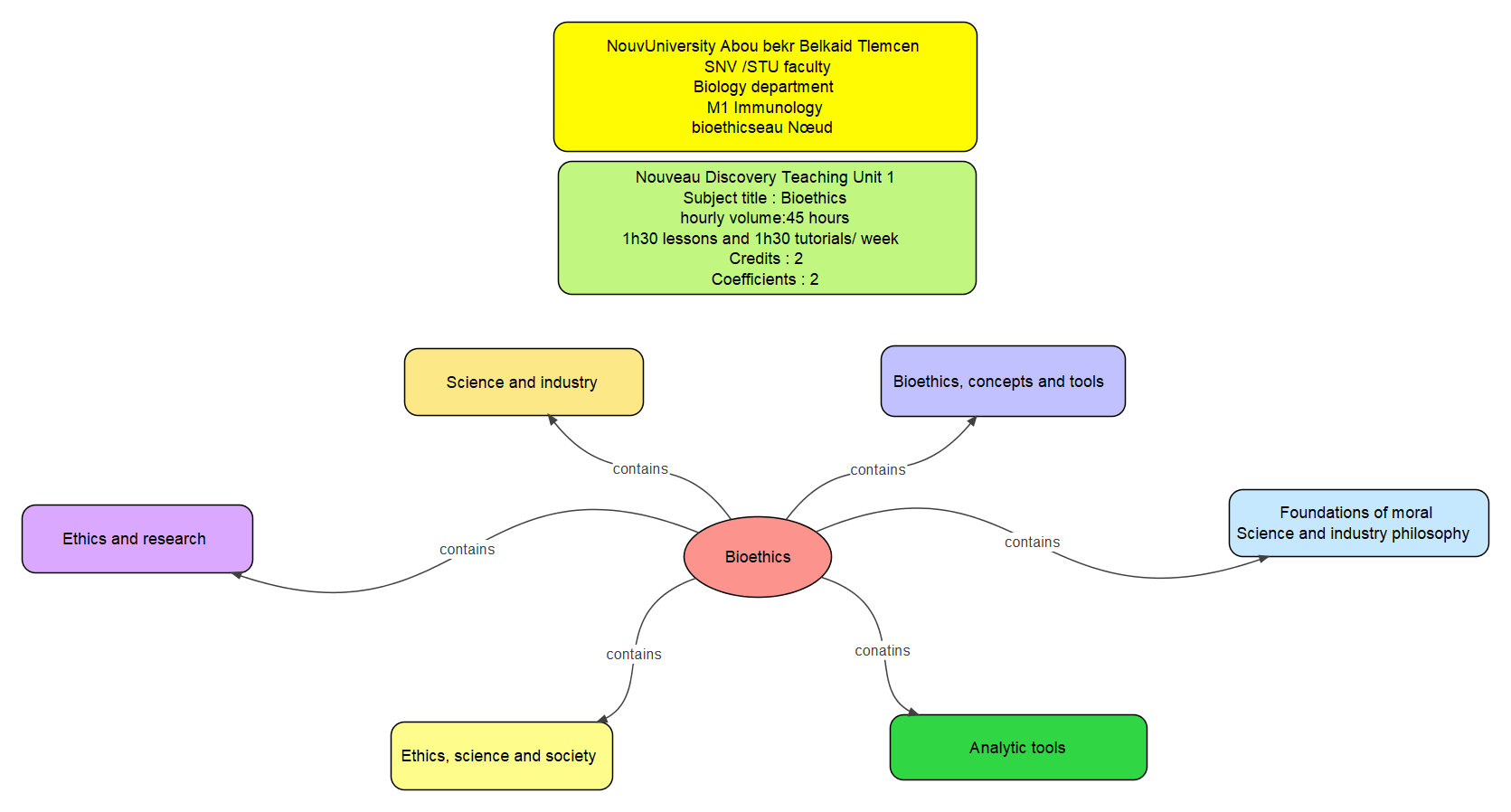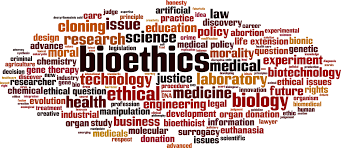Bioethics
Topic outline
-
-
This section allows all members of this class to ask questions and receive responses and pieces of advice regarding bioethics.
Your questions are most welcome here.

-
Here you can discuss your ideas concerning bioethics.

-
- Course title: Bioethics.
- Teacher: Dr DJELTI Farah.
- Institution: Department of Biology, SNV Faculty, UATB
- E-Mail: farah.djelti@univ-tlemcen.dz
- Address: Office N2, Faculty SNV/STU, Biology department, University of Tlemcen.
- Availability: Wednesday, 9:00 a.m. to 12:00 p.m.
- Credit:02
- Coefficient:02
- Overall hourly volume: 45 hours.
- Hourly volume per week: 1h30min of lessons, 1h30min tutorials.
- Course schedule: saturday online from 10 a.m. to 12 p.m.
- Tutorial schedule: wednesday from 13h00 p.m to 14h30 min p.m.
- Room: 15.
- Evaluation method: continuous assessment and final examination.

-
This course has several objectives concerning different area of knowldges and skills development for students :
1. Responsibility in Research and Innovation:
Promote an ethical approach to the development and application of biotechnologies, by assessing the long-term consequences.
2. Protecting Biodiversity:
Safeguard biological diversity and ecosystems, recognizing their intrinsic value and importance for human health and environmental well-being.
Encourage research and development practices that respect the natural balance and diversity of species.
3. Respect for Animal Rights:
Establish ethical standards for the use of animals in research, minimizing suffering and promoting animal welfare.
Examine the ethical implications of genetic engineering on animals, taking into account their welfare and dignity.
4. Ethical management of genetic resources:
Ensure fair and responsible use of genetic resources, respecting the sharing of benefits arising from their use.
Protect the traditional knowledge and rights of local and indigenous communities in relation to biological resources.
5. Biotechnology risk prevention:
Identify and manage the risks associated with the release of genetically modified organisms (GMOs) into the environment.
Develop biosafety and biovigilance guidelines to prevent adverse effects on human health and the environment.
6. Dialogue and Public Participation:
Promote open and inclusive dialogue on ethical issues related to biology and biotechnology, involving the various players in society.
Encourage public participation in decision-making processes concerning biotechnology policies and practices.
7. Confidentiality and Privacy:
Protect individuals' personal health information, particularly in the context of immunological research and vaccination programs.
Ensure confidentiality and privacy in the processing of health data.
8. Responsibility in Research:
Promote ethical conduct in immunological research, ensuring that studies are designed and conducted responsibly, with particular attention to the welfare of participants.
Encourage transparency and accountability in the publication and sharing of research results.
9. Risk Management:
Identify and manage risks associated with immunology research and clinical applications, implementing strategies to minimize potential harm.
-
- Bioethics, concepts and tools
- Foundations of moral philosophy (ethics of the good, ethics of duty, utilitarianism, post-modernism).
- Analytical tools (ethical matrix, reflexive balance method).
- Ethics, science and society
- Ethics and research
- Science and industry

-
Basic knowledge
- Introduction to Biology: Understanding of the fundamental concepts of biology to grasp the ethical issues related to the life sciences.
- Introduction to Philosophy or Ethics: A grounding in philosophy or ethics may be necessary to understand the theories and ethical principles addressed.
- General culture (intensive use is made of case studies).
Academic skills
- Information Research and writing skills: ability to research information, analyze texts and write clear, structured arguments.
- Critical Thinking Skills: Ability to critically evaluate arguments, identify presuppositions, and construct logical reasoning.
-
The advances in science in the field of life are such that they are shaking up our representations and our practices, and the concerns they raise regarding the future of man and humanity require ethical reflection. After a historical approach to the concept of bioethics and institutions, we will address the main key moments in the evolution of the production of living things, and we will reflect together on the possible consequences of these scientific revolutions.

-
The definition of bioethics is that it is a discipline responsible for addressing different issues of the morality of human beings, linked to the different actions and advances of biology as an experimental and functional science. Thus, bioethics is characterized by the incorporation of the vision and values specific to ethics when making decisions within the scientific, political, technological and philosophical fields of biology.

-
-
Books
Beauchamp, T. L., & Childress, J. F. (2013). The principles of biomedical ethics (7th ed.). Oxford University Press.
Hebert, P. C. (2009). Doing right: A practical guide to ethics for medical trainees and physicians. Oxford University Press.
Talbot, M. (2012). Bioethics: An introduction. Cambridge University Press.
Articles:
Emanuel, E. J., Wendler, D., & Grady, C. (2000). Ethics and clinical research. New England Journal of Medicine, 342(20), 1450-1454. [DOI: 10.1056/NEJM200005183422006]
Jonsen, A. R. (1998). The birth of bioethics. Oxford University Press. [DOI: 10.1093/jmp/26.5.401]
Emanuel, E. J., & Wendler, D. (2019). Four principles of biomedical ethics and the 21st Century Cures Act. JAMA, 321(22), 2073-2074. [DOI: 10.1001/jama.2019.3739]
The National Commission for the Protection of Human Subjects of Biomedical and Behavioral Research. (1979). The Belmont Report: Ethical principles and guidelines for the protection of human subjects of research. [Online document] Retrieved from https://www.hhs.gov/ohrp/regulations-and-policy/belmont-report/index.html


